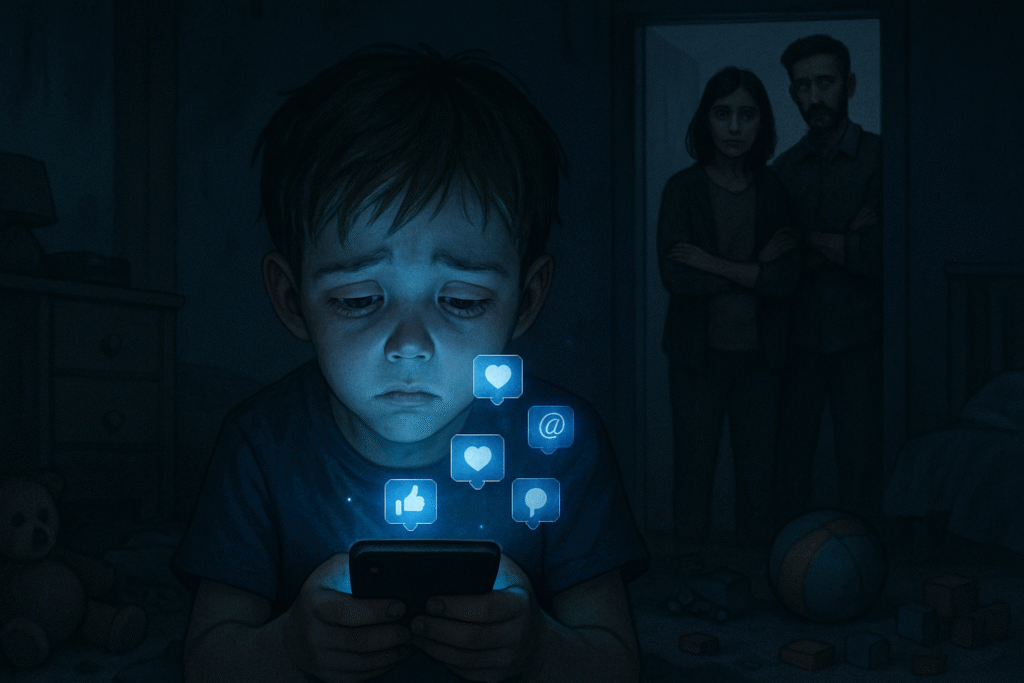In today’s digital age, children are increasingly glued to mobile phones and screens, leading to a silent but serious epidemic of screen addiction among the younger generation, especially Gen Z. This article explores the harmful effects of excessive screen time on children’s physical and mental health and offers practical advice for parents to combat this growing problem.
The Growing Problem of Screen Addiction
- A recent survey of over 70,000 Indian parents reveals that more than 66% believe their children are addicted to social media, OTT platforms, or online games.
- Children under 5 in India spend an average of 2.2 hours daily on screens, far exceeding the World Health Organization’s recommendation of zero screen time for children below 2 years and a maximum of 1 hour for toddlers aged 2–4 years.
- Screen addiction manifests as aggressive behavior, impatience, and even withdrawal from real-world social interactions.
Physical Health Consequences
Eye Problems and Myopia
- Prolonged screen exposure leads to weakening eyesight and increases the risk of myopia (nearsightedness).
- Myopia is becoming a widespread epidemic globally, with projections indicating half of Indian children could be affected by 2050.
Sleep Disorders
- Blue light from screens suppresses melatonin, the hormone responsible for sleep, leading to poor sleep quality and disorders such as insomnia.
- Children are particularly sensitive to this effect, resulting in reduced sleep duration and impaired cognitive and emotional health.
Obesity and Sedentary Lifestyle
- Excessive screen time reduces outdoor physical activity, contributing to obesity among children.
- Studies reveal children in countries like the US spend less time outdoors than prisoners, a shocking statistic with long-term health implications.
Mental and Cognitive Impact
Developmental Delays and Virtual Autism
- Lack of social interaction and excess screen time in early years cause speech delays, developmental issues, and conditions similar to autism, called “virtual autism.”
- Children need real-life, two-way interactions with caregivers to develop critical language and cognitive skills, which screens cannot provide.
Attention Deficit and Emotional Issues
- Screen addiction is linked to Attention Deficit Hyperactivity Disorder (ADHD), anxiety, depression, and increased emotional dependency on digital devices.
- The constant stimulation from fast-moving, colorful digital content shortens attention spans and causes irritability and social withdrawal.
The Addiction Cycle
- Engaging content on screens triggers dopamine release, activating the brain’s reward system similar to drug addiction.
- Over time, children need more screen time to achieve the same pleasure, leading to increased dependency and withdrawal symptoms like tantrums when screens are taken away.
Real-Life Cases
- Stories of children like Aarav and Kishan illustrate serious physical and psychological effects due to early and excessive exposure to screens.
- Many parents use screens as a convenience to pacify children, unaware of the long-term damage caused.
Practical Advice for Parents
Limit and Control Screen Time
- Avoid screens entirely for children under 2 and keep screen time minimal for toddlers under 5.
- Set strict time limits and monitor the content children access, prioritizing educational and interactive content.
Encourage Alternative Activities
- Promote outdoor play, creative games like building blocks and puzzles, dance, and social interaction for at least 3 hours daily.
- Create screen-free zones at home, such as bedrooms and dining areas.
Lead by Example
- Parents should reduce their own screen use when around children, as kids imitate adult behavior.
- Communicate and engage in face-to-face interactions to foster better emotional development.
Seek Professional Help if Needed
- Recognize signs of addiction and developmental delays early, and consult experts such as pediatricians and child psychologists.
- Parenting masterclasses and resources, such as those by Riddhi Deorah, can provide valuable guidance.
Conclusion
Mobile phone addiction is a serious threat to the health and future of Gen Z. The physical, cognitive, and emotional well-being of children are at risk due to excessive screen exposure. Parents play a critical role in managing and mitigating this problem by setting boundaries, encouraging healthy habits, and fostering real-life connections.


